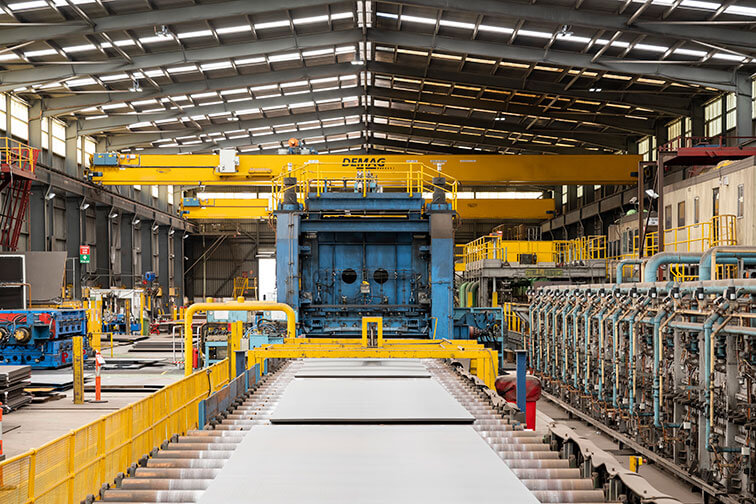Introduction
Bisalloy Steels’ Board of Directors is responsible for the corporate governance of the consolidated entity. The Board develops and implements best practice corporate governance, appropriate to the size of Bisalloy and its business. The Board and management believe that good corporate governance is essential to the performance and sustainability of the Company.
2. Board of Directors
The Board has adopted a formal Corporate Governance Code that recognises the respective roles and responsibilities of the Board and management.
2.1 Role of the Board of Directors
The Board is responsible for the overall governance of Bisalloy and its strategic direction. This includes:
• setting goals
• monitoring performance
• ensuring Bisalloy’s internal control and reporting procedures are adequate, effective and ethical
• ensuring Bisalloy’s strategic direction provides value for shareholders.
The Board regularly monitors the effectiveness of management policies and decisions, including the execution of its strategies.
As well as fulfilling its obligations to generate returns for shareholders, the Board is responsible to Bisalloy’s customers, employees, suppliers and to the welfare of the communities in which Bisalloy operates.
2.2 Board Composition & Independence
Acknowledging that members of the Board are appointed by shareholders, the Nominations & Remuneration Committee sets and reviews the criteria for the selection of new directors.
View details of the current Board members.
The following principles govern the overall composition of the Board:
- A majority of the directors should be independent directors
- The Chairman should be an independent director
- The positions of Chairman and Managing Director must be held by separate persons.
2.3 Meetings
The Board meets regularly to monitor management performance and the Company to ensure Board strategies and decisions are implemented. Details of the number of meetings held and attendance by each director are set out each year in the Annual Report.
2.4 Conflicts and Declaration of Interests
The Corporations Act 2001 imposes significant obligations on directors in relation to disclosure of interests.
3. Board Committees
The Board has established an Audit and Risk Committee and a Remuneration and Nominations Committee to help execute Board responsibilities and to consider complex issues in detail.
Both Committees are:
- governed by a Board-approved Charter
- comprised entirely of non-executive directors
- required to report to the full Board after each meeting
- sufficiently autonomous to be able to discharge their duties and responsibilities.
The Committees have the authority to select, retain and terminate external advisers without seeking approval of the Board or management.
Each year the Board reviews the composition and charters of its two Committees.
3.1 Audit & Risk Committee
The Audit & Risk Committee is responsible for ensuring that an effective internal control framework exists within the Company and the group. This includes:
-
- internal controls for effective reporting of financial information
- the appropriate application and amendment of accounting policies
- the identification and management of risk.
The Board has delegated the responsibility for the establishment and maintenance of a framework of internal control to the Audit and Risk Committee.
3.2 Nominations & Remuneration Committee
The Nominations and Remuneration Committee helps and advises the Board on matters relating to the appointment and remuneration of the directors, Managing Director and other senior executives and employees of the group.
An important function of the Committee is to establish performance criteria for the Managing Director. The Nominations and Remuneration Committee formally reviews the performance of the Managing Director at least annually. The Committee advises the Board of its recommendations. The Managing Director does not participate in these reviews.
4. Continuous Disclosure
The Company is a disclosing entity under the Corporations Act 2001. It is subject to the continuous disclosure requirements under the ASX Listing Rules. The Board is committed to informing stakeholders in a timely manner of all material developments and to the statutory disclosures included in the Annual and Half-Yearly Reports.
Download the Continuous Disclosure Policy.
The Company Secretary is responsible for communicating with the ASX. This role includes responsibility for ensuring compliance with the continuous disclosure requirement of the ASX Listing Rules and overseeing and coordinating information disclosed to the ASX, market participants and the public. All Company announcements, briefings, presentations, and reports are posted on the Company’s website after release to the ASX.
The Company also has formal Share Trading Guidelines that outline the prohibition against insider trading. It also specifies the ‘windows’ during which directors, executives and employees can deal in Bisalloy’s securities.
5. Risk Management
The Board, through the Audit and Risk Committee, is responsible for ensuring there are adequate risk management and compliance policies, procedures, and control systems. The Company developed a Risk Management Manual, which is updated annually. The manual deals with the significant controllable business risks faced by the Bisalloy group. It identifies the potential harm each risk may cause. It establishes ways to manage and mitigate the risks to reduce the likelihood of them causing harm and reduce the effects of any harm that may arise. Detailed control procedures cover areas such as trading, financial and legal risks and the risk of serious workplace injury, fraud, and functional breakdowns.
Bisalloy recognises the importance of quality, occupational health and safety (OH&S) and environmental issues and is committed to the highest levels of performance. To help meet this objective, Bisalloy has a fully integrated quality, safety and environmental management system. The quality system has been certified to be in accordance with ISO9001.
6. Ethical Standards & Code of Conduct
In line with Board policy, directors and management are expected to conduct themselves with the highest ethical standards. All directors and employees are expected to act with integrity and objectivity to enhance the reputation and performance of the Company.
Bisalloy aims to maintain the highest standard of ethical behaviour in its business dealings.
To maintain its ethical standards, the Company will:
- act with integrity in all its dealings with customers, suppliers, shareholders, employees, government and the community
- ensure that its actions comply with applicable laws and regulations
- maintain harmonious relations with communities located near the Company’s operations
- implement policies enable the Company’s employees to avoid situations where conflicts of interest could arise
- not engage in any activity that could be construed to involve an improper inducement
- achieve a working environment where:
i. equal opportunity is practiced
ii. harassment and other offensive behaviour is not tolerated
iii. the confidentiality of commercially sensitive information is protected
iv. employees are encouraged to discuss concerns about ethical behaviour with their supervisor.
The Board is responsible for establishing compliance and evaluating the effectiveness of the Company’s ethical standards & Code of Conduct.
PDF’s
- Audit and Risk Committee Charter Policy
- Bisalloy Modern Slavery Statement
- Code of Business Conduct Policy
- Conflict of Interest Policy
- Continuous Disclosure Policy
- Corporate Governance Code
- Equal Employment Opportunity and Anti-Discrimination Policy
- Inclusion Policy
- Nominations and Remuneration Committee Charter
- OLD – Privacy Policy
- Policy for Dealing in Securities



